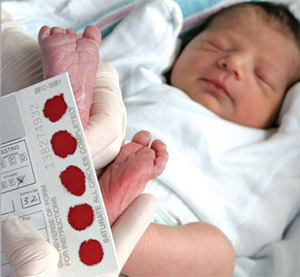Newborn screening

Neonatal Screening Program
Since 1995, Maternal and Child Health Department – Ministry of Health, UAE – offers newborn screening as a service to families with new babies. This program finds newborn babies with certain serious disorders and these can be treated if detected early.
Why is my baby tested?
The testing is done to make sure that your baby will be as healthy as possible. The Newborn Screening Program finds babies who may have one of several disorders and alerts the doctors to this possibility. With early diagnosis and medical treatment, serious illness can usually be prevented.
How & when is my baby tested?
Every baby born in hospital will be given a form for neonatal screening accompanied by an information leaflet and the mother will be told where to take her baby for screening (usually nearest center / hospital of the district).
The baby will attend the designated center on the third day (>48 hours after birth) as possible. Blood is collected by heel prick onto a special filter paper. The laboratory needs just a tiny bit of blood to do all the test described in this brochure. The heel prick feels no worse than being stuck by a pin.
What disorders can newborn screening identify?
The newborn screening program tests babies for the following conditions. They are:
Metabolism disorders by Tandem Mass Spectrometry:
- Amino Acid Disorders: e.g.
- Phenylketonuria (PKU)
- Maple syrup urine diseases
- Citrullinemia type I
- Argininosuccinic aciduria
These disorders can cause seizures and severe brain damage. A special formula and a diet can prevent the brain damage and mental retardation.
- Organic acid disorders: e.g.
Babies with these disorders cannot remove certain waste products from their blood. They may even go into a coma if they are not treated.
- Propionic acidemia,
- Methylmalonic acidemia
- Isovaleric acidemia
- 3-Methylcrotonyl CoA carboxylase deficiency
- Beta Ketothiolase deficiency
- 3-Methyl-3-OH-glutaryl CoA lyase deficiency
- Glutaric aciduria type I
- Fatty acid disorders: e.g.
Medium Chain Acyl Co-A Dehydrogenase deficiency (MCAD):
This fatty acid disorder causes the baby’s body to be unable to use certain kinds of fat to make energy. Babies with MCAD can have trouble breathing and have seizures. Their hearts may even stop beating.
Endocrine Disorders:
- Congenital Hypothyroidism
In this disorder, the thyroid gland does not work properly. This leads to mental retardation and slow growth. Giving thyroxin pills can prevent these problems.
- Congenital Adrenal Hyperplasia (CAH)
The body lacks an enzyme needed by the adrenal glands to make the hormones, cortisol and aldosterone. Cortisol is needed for making energy and aldosterone is needed for proper salt and water balance. Without aldosterone the baby will lose salt and water in the urine and get dehydrated. The adrenal glands also puts all the raw materials into making androgens. Too much male hormone makes the genitals of baby girls look unusual. CAH is treated by giving the missing hormones.
Sickle Cell Hemoglobinopathies:
- Sickle cell disease (HB S / S)
- S-Beta thalassemia
Sickle cell anemia is a serious blood disorder. Under certain conditions the abnormal blood cells can clog up the small blood vessels causing painful “crises”. Babies with sickle cell anemia also have less resistance to infections, which may be life threatening. A regular treatment program using penicillin by the age of 2 months and special immunizations helps avoid serious complications.
Others:
- Biotinidase deficiency (BIO)
In this disorder, baby’s body cannot use biotin, a vitamin in food. Without biotin, babies cannot grow and a child might develop muscle weakness, hearing loss, vision (eye) problems, hair loss, skin rashes and seizures. To treat this disorder, baby must take a special form of biotin.
- But my baby seems healthy. Are the tests still needed?
Yes, the tests are needed. Most infants with conditions found by the Newborn Screening Program have no obvious signs of illness right after birth. However, each of these disorders can cause serious problems. Once the damage has occurred, it can never be repaired.
- How does a baby get one of these disorders?
Except for most cases of hypothyroidism, a baby inherits the disorder from both parents. Parents and relatives usually show no sign of the disorder. In most cases of hypothyroidism the cause is not known. In a few, it is inherited.
- How soon will I know the results?
In most cases, the results will be normal and you will not be personally notified. Results are usually available in about ten days. Generally, parents are notified only if there is a problem.
Although “no news is good news”, it is important to remember that these tests only find the disorders listed in this brochure. Even if your baby does not have one of these disorders, there may be other medical problems that cannot be picked up by these tests. Therefore, it is very important for your baby to have regular checkups and good general medical care.
- What if I am told that a “retest” is necessary?
A retest may be needed for a number of reasons. It does not mean there is anything wrong with your baby. It usually means that another sample is needed so that all tests can be completed.
If you are asked to have your baby retested, please act quickly!
- What if my baby has one of these disorders? Is there a cure?
Because most of these disorders are genetic problems, they cannot be “cured”. However, the serious effects of the disorder can be controlled and often completely prevented by early treatment. The treatment is usually a special diet or medication. The MCH Section will make arrangements for referral and treatment.
- If this child has a disorder. Will my future children also have it?
The answer to this question will depend on your child’s diagnosis. It can best be answered by a genetic counselor.
Give your baby a healthy life start
